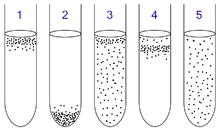- Obligate aerobe
-
 Aerobic and anaerobic bacteria can be identified by growing them in liquid culture:
Aerobic and anaerobic bacteria can be identified by growing them in liquid culture:
1. Obligate aerobe
2. Obligate anaerobe
3. Facultative anaerobic organism (continuum with "Facultative aerobic organism")
4. Microaerophile
5. AerotolerantAn obligate aerobe is an aerobic organism that requires oxygen to grow. Through cellular respiration, these organisms use oxygen to oxidize substances, like sugars or fats, in order to obtain energy. During respiration, they use oxygen as the terminal electron acceptor. They have the advantage of yielding more energy than obligate anaerobes, but face high levels of oxidative stress.[1]
Examples of obligate aerobic bacteria: Nocardia (Gram-positive), Mycobacterium tuberculosis (acid-fast), and Bacillus (Gram-positive).
Pathogenic bacteria Bacterial disease · Coley's Toxins · Exotoxin · Lysogenic cycle
Human flora Substrate preference Oxygen preference Structures Cell wall: Peptidoglycan (NAM, NAG, DAP)
Gram-positive bacteria only: Teichoic acid · Lipoteichoic acid · Endospore
Gram-negative bacteria only: Bacterial outer membrane (Porin, Lipopolysaccharide) · Periplasmic space
Mycobacteria only: Arabinogalactan · Mycolic acidOutside envelopeCompositeShapes References
- ^ "Obligate aerobe - definition from Biology-Online.org." Biology Online. Biology-Online, n.d. Web. 12 Dec 2009. <http://www.biology-online.org/dictionary/Obligate_aerobe>
Categories:
Wikimedia Foundation. 2010.
